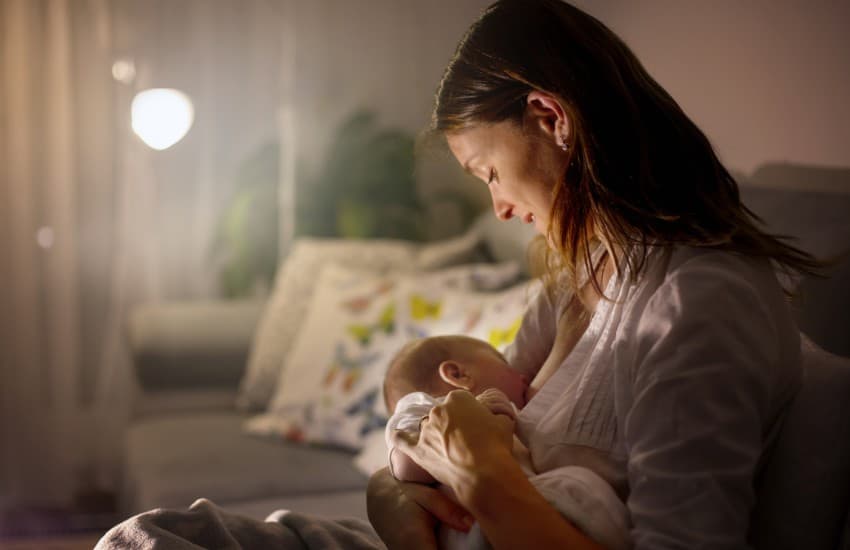Breastfeeding and COVID-19: Your questions answered

Breast milk is the best source of nutrition for most infants, and one of the most effective ways to protect your baby from a variety of illnesses. But as COVID-19 continues to spread, so does inaccurate and unsubstantiated information that might leave you feeling uncertain about your ability to breastfeed.
While much is still to be determined about COVID-19, here’s what we know so far.
Can I continue breastfeeding if I have been diagnosed with COVID-19?
If you have been diagnosed with (or are suspected of having) COVID-19, you can continue to breastfeed if you are well enough to do so.
Person-to-person transmission of COVID-19 is thought to occur through respiratory droplets produced when an infected person coughs or sneezes, similar to how influenza and other respiratory pathogens spread.
In limited studies on women with COVID-19 and another coronavirus infection, Severe Acute Respiratory Syndrome (SARS-CoV), the virus has not yet been detected in breast milk.
Given the benefits of breastfeeding and the insignificant role of breast milk in the transmission of other respiratory viruses, the World Health Organization, Australian Breastfeeding Association, the US Centers for Disease Control and Prevention (CDC) and the United Nations Children’s Fund (UNICEF) have recommended that mothers can continue breastfeeding while applying all the necessary precautions outlined below.
How can I reduce the risk of spreading the virus to my baby?
It is recommended that you practise necessary precautions to avoid spreading the virus to your infant, including:
- Washing your hands using soap and water or an alcohol-based sanitiser before touching your baby
- Wearing a face mask, if possible, while feeding at the breast
- Cleaning and disinfecting surfaces, toys and other items that will come into contact with your baby
What if I am too unwell to breastfeed?
If you are too unwell to breastfeed your baby, another option is to express breast milk regularly. Before expressing, it’s important to wash your hands thoroughly with soap and water. If using a breast pump, ensure it is properly cleaned and disinfected. If possible, consider asking someone who is well to feed the expressed breast milk to your baby.
The Australian Breastfeeding Association has provided recommendations on expressing and storing breastmilk.
Will my breast milk supply reduce if I have COVID-19?
Some mothers have noticed a drop in supply when they are unwell. If this happens to you – or if you have stopped breastfeeding and need help to restart – you can call the Australian Breastfeeding Association’s Breastfeeding Helpline on 1800 686 268 for support from a trained counsellor.
If I’m pregnant, can I transmit COVID-19 to my unborn baby?
It is presently unclear whether the virus can be transmitted from a mother to her baby during pregnancy, or the impact this might have on the baby. This is being investigated, but in the meantime, pregnant women should continue to take the appropriate precautions to protect themselves from exposure to the virus.
What else can I do?
We can all play a part in minimising the chances of spreading COVID-19 to others, even if we don’t have symptoms ourselves. Remember to:
- Wash your hands often using soap and water or an alcohol-based hand sanitiser
- Cover your mouth and nose with a bent elbow or tissue when coughing or sneezing, and immediately throw away any used tissues
- Avoid close contact with anyone who has cold or flu-like symptoms
If you or someone in your care has COVID-19 symptoms – including a fever; respiratory illness symptoms such as a cough, fatigue, sore throat or headache; and difficulty breathing – and you are seeking a nurse assessment, call 13 HEALTH (13 43 25 84).
If you are experiencing the above symptoms, and you have travelled in the past 14 days, contact your GP immediately. Be sure to call ahead and advise of your symptoms and recent travel so the clinic can take the necessary precautions before your appointment.
If you are in quarantine and need essential supplies, call the Community Recovery Hotline on 1800 173 349.
For mental health support, call 1800 61 44 34.
In an emergency, call Triple Zero (000).
This is a rapidly developing situation. For the most up-to-date and reliable information on COVID-19, visit www.health.qld.gov.au/coronavirus.


